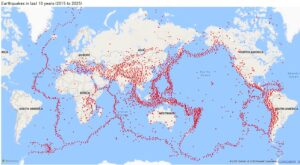Something unusual is happening to our planet, and scientists are racing to understand why. For billions of years, Earth’s rotation has been gradually slowing down, mainly due to the Moon’s gravitational pull. But that trend has recently reversed.
Since around 2020, Earth has been spinning slightly faster, and now we’re seeing the shortest days ever recorded. This isn’t a shift you would feel, but the planet is rotating milliseconds faster than usual.
In July and August 2025, scientists expect three of the fastest-spinning days in modern history. On July 9, July 22, and August 5, Earth is forecast to complete its spin between 1.3 and 1.5 milliseconds faster than the standard 86,400 seconds that make up a 24-hour day.
So far, the overall record occurred on July 5, 2024, when the Earth completed its rotation 1.66 milliseconds faster than usual. These tiny shifts might sound trivial, but they could have serious consequences.
Theories but no explanations
The big unanswered question is what’s causing Earth to pick up speed? Scientists do not have a clear answer. One contributing factor may be the Moon’s position. Another could lie deep underground with changes in the Earth’s core and mantle. It is even possible that earthquakes, shifts in ocean currents, and the melting of polar ice might play a role. All of these situations slightly redistribute the planet’s mass, and in turn, impact its spin.
So far, all these ideas are simply theories. “Nobody expected this,” said geophysicist Leonid Zotov of Moscow State University. “The cause of this acceleration is not explained.”
This new phenomenon isn’t just an academic mystery. If clocks and Earth’s spin fall out of sync, it could affect GPS systems, communication networks, and electric power grids. A shift of just one millisecond can throw off navigation and timing systems by hundreds of meters.
Coordinated Universal Time (UTC) is the global standard used for everything from GPS systems to financial markets. It relies on Earth’s rotation staying in sync with atomic clocks. To keep things accurate, timekeepers occasionally add or subtract leap seconds. If this speeding trend continues, we might soon need a negative leap second -– the deletion of a second from our clocks. That has never been done before, and could cause a major headache for the technologies that rely on ultra-precise timing.
What is most weird about all of this is that Earth’s rotation has been slowing for millions of years. Seventy million years ago, during the time of the dinosaurs, a day on Earth was just over 23 hours long. It is possible that over geologic time, Earth will still show a general slowing trend. But for now, these sudden accelerations are puzzling.






